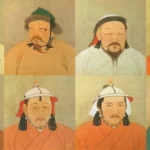Feodor Vassilyev, a Russian peasant, is shrouded in a centuries-old debate: Did his wife, Valentina Vassilyeva, truly give birth to 69 children? This astonishing claim has captivated historians, scientists, and storytellers for generations, sparking both awe and skepticism. Could this seemingly impossible feat be true, or is it merely a product of embellished tales passed down through time?
The Extraordinary Claim of a Prolific Family
The story of Feodor Vassilyev, who lived from approximately 1707 to 1782, unfolds in the rural village of Shuya, Russia. While seemingly an ordinary peasant, Vassilyev’s name is forever linked with an extraordinary claim: fathering 87 children. The staggering number is attributed primarily to his first wife, Valentina Vassilyeva, who is said to have given birth to 69 children between 1725 and 1765.
According to historical accounts, Valentina’s pregnancies resulted in an unheard-of number of multiple births: 16 pairs of twins, seven sets of triplets, and four sets of quadruplets – a total of 27 pregnancies over 40 years. If true, this would make her the most prolific mother in recorded history. Following Valentina’s death, Feodor supposedly went on to have 18 more children with his second wife, further solidifying his place in this baffling tale of fertility.
Whispers Through Time: Tracing the Historical Evidence
The Vassilyev story, while intriguing, rests on a foundation of anecdotal evidence and fragmented historical records. The earliest known mention appears in a 1783 edition of The Gentleman’s Magazine, a prominent British publication of the time. The magazine cites an unnamed English merchant in St. Petersburg, Russia, who claimed to have heard the story directly from the Vassilyev family. The merchant even stated that Feodor was due to be presented to the Empress of Russia.
Adding further weight to the tale, Russian historian Ivan Nikitich Boltin documented the Vassilyevs in his 1788 writings on Russian history. Similarly, Alexander Pavlovich Bashutskiy referenced the family in his 1834 book, “Saint Petersburg Panorama”. These scattered accounts, while intriguing, lack the concrete documentation needed to confirm the extraordinary number of births.
Unraveling the Skepticism: The Improbable Biology and Missing Records
Despite its captivating nature, the Vassilyev story has been met with considerable skepticism, particularly from the scientific community. The frequency of multiple births attributed to Valentina Vassilyeva far exceeds the statistical probability of such occurrences. While twins and triplets occur naturally, the sheer number and consistency of multiple births in this case are extremely rare, even today, with the aid of modern fertility treatments.
Adding to the skepticism is the absence of official birth records from 18th-century Russia. Record-keeping during this period was often inconsistent, particularly in rural communities. This lack of reliable documentation makes it difficult, if not impossible, to definitively prove or disprove the Vassilyevs’ claim.
Beyond the Numbers: Examining the Historical Context
While the veracity of the Vassilyev story remains uncertain, it provides valuable insight into the historical context of fertility, record-keeping, and societal views of large families.
-
Fertility and Mortality in the 18th Century: Infant and child mortality rates were significantly higher in the 18th century due to factors such as disease, malnutrition, and limited medical care. While large families were common, the survival of so many children, particularly from multiple births, would have been highly unusual.
-
Evolving Record-Keeping Practices: The lack of standardized record-keeping in 18th-century Russia allows for inaccuracies and inconsistencies. Stories, often passed down orally, could be easily exaggerated or distorted over time, potentially contributing to the extraordinary nature of the Vassilyev tale.
-
Social Significance of Large Families: In many cultures, large families were seen as a sign of prosperity and blessings. A large number of children could contribute to a family’s workforce, particularly in agricultural societies. However, the challenges of providing for such a large family would have been substantial.
Feodor Vassilyev’s Legacy: A Tale of Intrigue and Uncertainty
The story of Feodor Vassilyev and his purportedly massive family continues to fascinate and spark debate centuries later. While definitive proof of Valentina Vassilyeva’s 69 children remains elusive, the story endures as a testament to our fascination with the extraordinary and the enduring power of a good story.
The Vassilyev case serves as a reminder of the challenges inherent in historical research, particularly when dealing with anecdotal evidence and limited documentation. It compels us to question what we believe, how stories evolve over time, and the importance of critical analysis when navigating the annals of history.
Perhaps, hidden within the layers of speculation and doubt, lies a kernel of truth, a unique set of circumstances yet to be fully understood. Or maybe, the Vassilyev story will forever remain an enigma, a captivating blend of fact and folklore that continues to pique our curiosity about the limits of human biology and the enduring power of a good story.
















